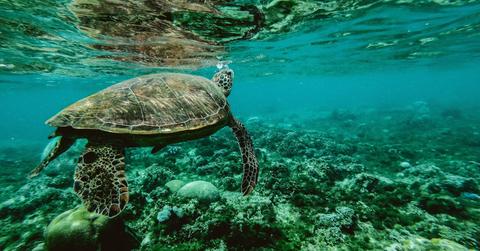Australia Is Pouring $349 Million Into Funding For The Great Barrier Reef
The Great Barrier Reef has been facing more and more danger from every side and some don't think the government is going far enough in addressing its root problem.
Updated May 17 2019, 1:11 p.m. ET
The Great Barrier Reef is receiving a big supportive measure from the Australian government in the form of money that will pay for a number of new strategies to combat bleaching and other environmental dangers faced by the coral ecosystem. According to Reuters, the Reef was almost added to the "in danger list" by the United Nations cultural body UNESCO last year. In a survey last year, scientists discovered that over 900 miles of the reef had been destroyed by back-to-back bleaching events in 2016 and 2017, reports CNN.
A second issue was an outbreak of coral-eating starfish, called crown-of-thorns starfish. The starfish spreads its body across the coral, then releases a digestive enzyme that slowly breaks the coral down so the starfish can ingest it.
But one big destroyer of the coral reef that the government is attacking first is farm run-off, as it's at the root of most of these problems. There are many sugar cane and cattle farms close to the shore, which means large amounts of industrial agricultural waste gets to the ocean and smothers the coral in sediment and pollution.
Energy Minister Josh Frydenberg stated much of the money would go to pay farmers to change practices that caused agricultural runoff “to ensure that the reef doesn’t get the large amounts of sediment, nitrogen and pesticide run-off which is so damaging to coral and which helps breed this crown-of-thorns starfish.”
But there is skepticism around this plan.
Some environmentalists say that the money will just continue to fund existing programs, and no real innovations are being made.
A professor at James Cook University’s Coral Reef Studies Centre of Excellence, Jon Brodie, told Reuters reporters that these programs are not doing what they're supposed to.
“It’s not working, it’s not achieving major water quality improvements,” said Brodie. This is not dissimilar to what critics have had to say about Australia's recent 2025 goal to use only recyclable packaging in all production—too little, too late.
But the plan has been approved by the UNESCO World Heritage Committee, who first made the reef a World Heritage Site in 1981 in an effort to protect it. However, there has been virtually no mention of divesting from fossil fuels or the dangers of climate change to natural wonders like the coral reefs of our oceans. Business Insider reports that Terry Hughes, who was the lead author of a recent study on the coral bleaching devastation of the reef, tweeted, "We're not going to fix the challenge of climate change for coral reefs by killing a few starfish in Queensland."
Until greater measures are taken, even $349 million is a stop-gap.
